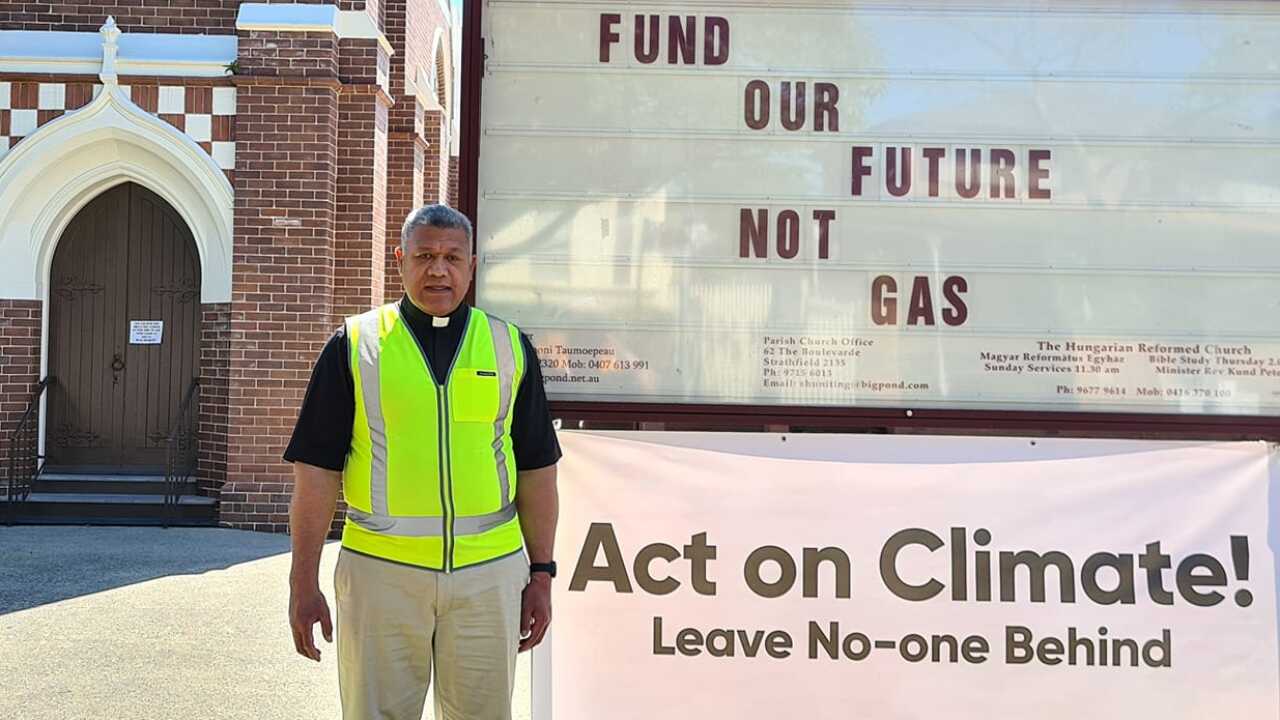

4 min read
This article is more than 3 years old
Opinion
Climate change is destroying my homeland of Tonga and my home in Australia. Let's act now
While sea level rise is hurting my homeland, I am not escaping the impacts of climate change in my adopted home of Western Sydney, writes Reverend Alimoni Taumoepeau.
Published 22 April 2021 4:45pm
Updated 22 February 2022 5:20pm
By Reverend Alimoni Taumoepeau
Image: Reverend Alimoni Taumoepeau. (Supplied)
In January 2019 a young man came to me, distraught. His elderly mother was a member of my Western Sydney Uniting Church congregation and as the minister, he was asking my advice.
It had been a stifling hot summer and his mother was living in an old apartment, with no air conditioning. The many days of 40+ degree temperatures were taking its toll on her health and so her son was considering moving her to a cooler suburb.
It was an incredibly difficult decision for him. If he moved her she’d lose her friends, her community, her support network. But if he left her, he feared her health would continue to decline.
This is what the communities that I minister to are dealing with every year, year after year: serious health problems, threats from mega-fires, smoke pollution, floods. Life in Western Sydney is simply becoming unlivable. This is the human cost of global warming.
Born in Tonga, I came to Australia to study theology in 1987, as a 25-year-old man. I have many family members still living there and before the COVID-19 pandemic, I would return every couple of years. I hope to get back there again as soon as international borders open up, but I’m not looking forward to it.
That’s because Tonga is not the island paradise I remember. Instead, it is drowning.
Tonga is not the island paradise I remember. Instead, it is drowning.
Climate change is taking a dreadful toll on my homeland. Sea level rise has decimated much of the coastline and more frequent, more damaging cyclones have destroyed many homes and livelihoods. I know - my family has been among the victims.
Carefree island life is not as ubiquitous as it once was. I’ve seen the mental health issues that come from literally losing the roof over your head, having to live in a tent for months - sometimes years - and being struck down by grief for the land you have lost.
And for the people of Tonga, it’s only going to get worse. Watching this from Sydney, I feel helpless. I can’t offer practical help as my Tongan family struggles to survive. I am there for them emotionally though, and through my work with the Uniting Church, I advocate for them.
Watching this from Sydney, I feel helpless. I can’t offer practical help as my Tongan family struggles to survive. I am there for them emotionally though, and through my work with the Uniting Church, I advocate for them.

Reverend Alimoni Taumoepeau (blue scarf) at a demonstration. Source: Supplied
I encourage Pacific communities to stand up and speak out publicly about the crisis they’re experiencing. I speak out here in Australia too, calling on our political leaders to listen to the cries from our neighbours and contribute more to reducing emissions.
It’s the least I can do.
Climate change is not a political issue. It is a human issue. And until we recognise the devastation that climate change is doing to human life, I can not stop speaking out.
Climate change is not a political issue. It is a human issue.
As world leaders meet for this week, my hope is that they will come together and see the mutual benefits if all nations take strong, fast action to reduce emissions. This is the time for us all to contribute, in order for us all to have a future.
The Australian government must make concrete decisions to cut emissions. We have been far behind other countries and we haven’t yet seen deep investment in renewable energy. So this week, I hope the Morrison government will stand up and make a decision for the people of Australia and the Pacific now, and in the future.
Reverend Alimoni Taumoepeau has been a Uniting Church minister for 22 years.


